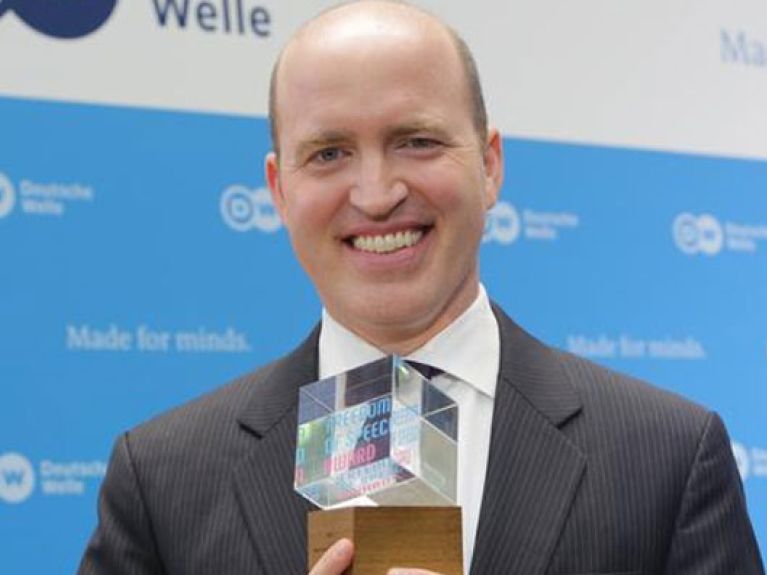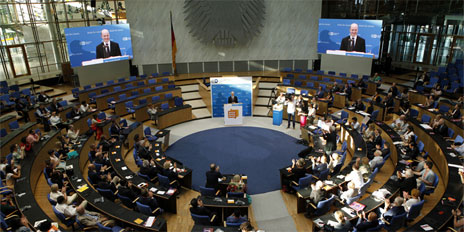Award for “enemy of the people”
The Deutsche Welle “Freedom of Speech Award” goes to the “White House Correspondents’ Association.”

The voice of Vietnamese singer Mai Khôi Do Nguyen entices the last stragglers into the hall. They have just taken a minute between two points on the agenda to drink a strong coffee or swap business cards. They are journalists and media professionals from all over the world, who have come to the Global Media Forum 2017. Deutsche Welle, the German public international broadcaster, is hosting the media conference. The hall is the former plenary hall of the German Bundestag in Bonn. Anyone entering it first sees the five-and-a-half-meter-high Federal Eagle resplendent on the facing wall. It radiates a seriousness and magnitude that befit this evening of 19 June 2017. For after the song performed by Mai Khôi, it is here tha the Deutsche Welle “Freedom of Speech Award” is to be bestowed.

The recipient of the award is the “White House Correspondents’ Association” (WHCA), an association of journalists who report on the White House and the US President’s policies. It was clear from every speech how surprising this choice was. “What am I doing here? It must be a mistake, a big misunderstanding,” said Gregor Mayntz in his laudatory speech, summing up his dismay. Mayntz is Chairman of the Federal Press Conference, the German counterpart to the WHCA. “A Freedom of Speech Award for colleagues in the ‘land of the free’”, he added, “that is hard to believe.”
Standing ovation
The choice of laureate may have been surprising but also convinced not just the speakers, but, judging by the standing ovation the announcement received, also most of the audience present. The speakers did not mince words. Monika Grütters, State Minister for Cultural and Media Affairs, explained: “Journalists, who are being vilified as enemies of the people, are seeing themselves confronted with a declaration of war.” She was alluding to the statements made by US president Donald Trump. In a speech the latter had exclaimed he was at war with the media; in a tweet he pronounced “Fake news media,” among which he counts the reputable ‘New York Times’, to be “an enemy of the American people”.
Peter Limbourg, director of radio station Deutsche Welle, did not beat around the bush either: “The president is acting like an insulted king and declaring those media outlets with which he does not agree to be the public enemy.” Deutsche Welle, Limbourg said, “understands this accolade as being a recognition of free press everywhere in the world and in the US.” But Limbourg also had words of warning: “I very much hope that Donald Trump will not be used to fuel anti-American sentiment in Germany, which sadly does exist here, too. The USA are a wonderful nation with wonderful people and inspiring artists and scientists, not to mention very great journalists.”
Jeff Mason is one of those journalists, and he took receipt of the prize as a representative of the WHCA. Since mid-2016, the correspondent for British news agency Reuters has been the association’s chairman. He chose his words carefully in his thank-you-speech. The WHCA’s main function was making access to the White House possible for its members. Mason diplomatically pointed out that access to the White House was “actually quite good”. At the same time, he also alluded to the fact that the WHCA had had to fight some tough behind the scenes battles to achieve this. The freedom of speech and press, Mason said, are guaranteed by the American constitution. However, he had learned, “that we cannot see these rights, or the law that guarantees them, as givens.”
Importance of the freedom of press world-wide
Needless to say, journalists in the US are in a distinctly better position than those in many other places in the world. Mason emphasized this several times. A glance at the former winners of the Freedom of Speech Award also makes this clear. The first laureate, Raif Badawi, has spent the last five years in a jail in Saudi Arabia. The activist was sentenced to 1000 lashes, ten years in jail and a high fine for running a website for political debate. The next winner, Sedat Ergin, faced a long prison sentence. The then-editor in chief of the Turkish daily newspaper “Hürriyet” was accused of having “maliciously twisted” a quote by Turkish President Erdoğan.
“If accepting this prize will help to shine a light on the meaning of the freedom of press worldwide,” so Jeff Mason said wrapping up his acceptance speech, then he would like to “ humbly and gratefully accept it”. He also wanted to lead by example, Mason explained with a small sideways swipe at the US president and would be more than happy to take questions from the audience. After the laughter in the room had died down, the first question concerned junior journalists: Did he have any recommendations for young people in times like these? “The times could not be better for becoming a journalist,” Mason replied without hesitation. “We need good people.”
“Journalism is more important than ever”: Interview with Peter Limbourg, director of Deutsche Welle

